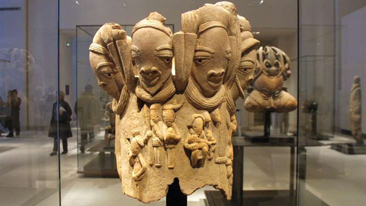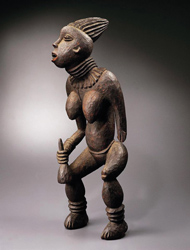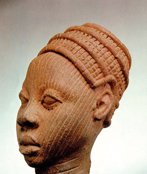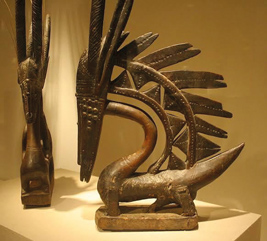Africa's Stolen Artefacts
01/06/21, Bunmi Akpata-Ohohe

Hundreds of Nigerian artefacts, stolen
during pre-colonial period are in
museums in Europe and the United
States
There's renewed pressure on European museums to return looted cultural objects to owner-countries on the continent.
The Netherlands has of late returned a "priceless and timeless" terracotta head which is supposed to be at least 600 years old to Nigeria. The terracotta head was reportedly stolen from the ancient city of Ile Ife, south-west Nigeria, and smuggled through Ghana to the Netherlands, officials have alleged. Harry Van Dijk, Dutch ambassador to Nigeria returned the "priceless" artefact to Nigeria's Information and Culture Minister Lai Mohammed, at an extraordinary ceremony in the Nigerian capital, Abuja. The Netherlands is only one of many European countries struggling to justify the legitimacy of cultural treasures in their museums, which were stolen from African nations during colonialism.

One of those Western countries harbouring and displaying some of these priceless and looted cultural artefacts in their museums, is Great Britain. The London Horniman Museum, for example, has come up with a new proposition to consult with London-based Nigerians on the return of looted world-renowned Benin bronzes to Nigeria. The question on the lips of everyone associated with these stolen African artefacts - the colonial collection held in Horniman Museums- is why consult with London-based Nigerians? Why not just return the artefacts to the authorities of the country where they were looted and stolen from, in this case Nigeria?
The Horniman Museum is located in the Forest Hill area of South East London and it is under relentless pressure to return the Benin bronzes to Nigeria. Commentators question if this so-called consultation, termed "Rethink Project", is yet another delay manoeuvre to allow the museum to continue holding on to what does not belong to the museum in the first place.
The magnificent Benin bronzes and fifty other artefacts, which include religious objects, weapons, jewellery and plaques that adorned the royal palace of the Oba (King) of Benin, were stolen during a bloody invasion of Benin Kingdom in 1897, during which British troops exiled the Oba. A spokeswoman for the Horniman museum told Africa Today: "Usually, the debate around restitution and all things that go with it has been between one country or one institution and another in the UK. But we felt there was an important voice missing in all of this, which is the opinions of those diaspora communities living in the UK."

The spokeswoman said that the museum wanted to have "equitable conversations" about the collections and did not rule out their return to Nigeria. She further explained that a team of artists and experts from both Nigeria and the UK would research the artefacts before the public have their say. Adding, "Our primary focus will be holding equitable conversations about the future of our collections. This includes being open and transparent about what we have and what we know about it, as well as how these collections are currently used and stored, and what opportunities for access are currently available.
She also told Africa Today that the Horniman Museum together with the Pitt Rivers Museum in Oxford, the Museum of Archaeology and Anthropology in Cambridge, and World Museum Liverpool, are currently working on the project "Re-thinking to practice and build trust around African collections," engaging with colleagues in Kenya and Nigeria, and with African Diaspora communities in the UK, to explore the future of African collections in our institutions, and our future relations with African institutions. The museum will be issuing a call for people of Nigerian descent who have questions about the Horniman's collections and their care, to get in touch via a number of channels, so these conversations can start from March 2021 with a view to drawing conclusions by the end of the year.

Consultations with Nigerians at home and in the diaspora will create a report outlining recommendations on future access, care and ownership of collections from Nigeria. Horniman wants to ensure that conversations about the future of the Nigerian collections happen in a way that means people can speak freely and openly and with the confidence that their opinions, questions and concerns are taken seriously.
The fact that many of the Nigerian collections were acquired in a context that was not equitable, means that the opinions, questions and concerns of Nigerians should be prioritised in these conversations, said the museum.
Comment on this story



